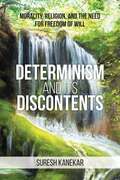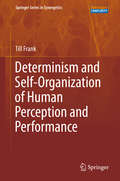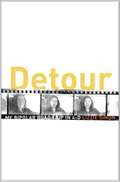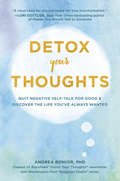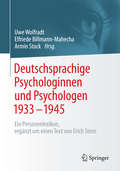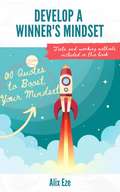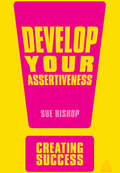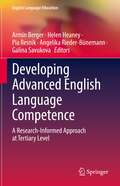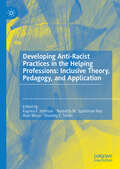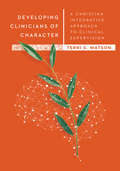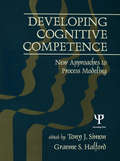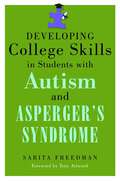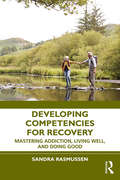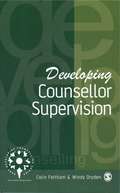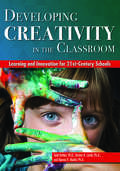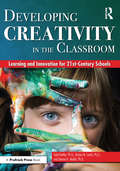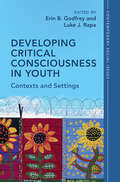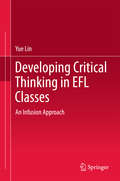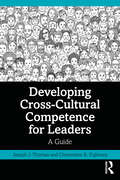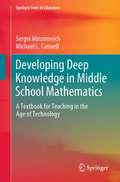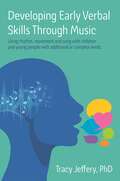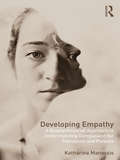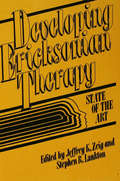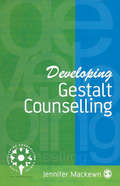- Table View
- List View
Determinism and Its Discontents: Morality, Religion, and the Need for Freedom of Will
by Suresh V. KanekarThe deterministic position is that all events are effects of previous events and causes of future events, in inexorable cause-effect sequences, which leave no room for intervention of anything outside of the stream of causal relationships, such as free wi
Determinism and Self-Organization of Human Perception and Performance (Springer Series in Synergetics)
by Till FrankThis book discusses human perception and performance within the framework of the theory of self-organizing systems. To that end, it presents a variety of phenomena and experimental findings in the research field, and provides an introduction to the theory of self-organization, with a focus on amplitude equations, order parameter and Lotka-Volterra equations. The book demonstrates that relating the experimental findings to the mathematical models provides an explicit account for the causal nature of human perception and performance. In particular, the notion of determinism versus free will is discussed in this context. The book is divided into four main parts, the first of which discusses the relationship between the concept of determinism and the fundamental laws of physics. The second part provides an introduction to using the self-organization approach from physics to understand human perception and performance, a strategy used throughout the remainder of the book to connect experimental findings and mathematical models. In turn, the third part of the book focuses on investigating performance guided by perception: climbing stairs and grasping tools are presented in detail. Perceptually relevant bifurcation parameters in the mathematical models are also identified, e.g. in the context of walk-to-run gait transitions. Chains of perceptions and actions together with their underlying mechanisms are then presented, and a number of experimental phenomena – such as selective attention, priming, child play, bistable perception, retrieval-induced forgetting, functional fixedness and memory effects exhibiting hysteresis with positive or negative sign – are discussed. Human judgment making, internal experiences such as dreaming and thinking, and Freud’s concept of consciousness are also addressed. The fourth and last part of the book explores several specific topics such as learning, social interactions between two people, life trajectories, and applications in clinical psychology. In particular, episodes of mania and depression under bipolar disorder, perception under schizophrenia, and obsessive-compulsive rituals are discussed. This book is intended for researchers and graduate students in psychology, physics, applied mathematics, kinesiology, and the sport sciences who want to learn about the foundations of the field. Written for a mixed audience, the experiments and concepts are presented using non-technical language throughout. In addition, each chapter includes more advanced sections for modelers in the fields of physics and applied mathematics.
Detour: My Bipolar Road Trip in 4-D
by Lizzie SimonAfter being diagnosed with bipolar disorder, the author takes a road trip to meet others like herself
Detox Your Thoughts: Quit Negative Self-Talk for Good and Discover the Life You've Always Wanted
by Andrea Bonior, PhDIn Detox Your Thoughts, popular psychologist Andrea Bonior, PhD, identifies the 10 most prevalent mental traps that make people feel anxious, insecure, and generally just bad.Clinical psychologist Andrea Bonior has spent over twenty years studying, teaching, and practicing the science of thoughts, emotions, and behavior. In Detox Your Thoughts, she uses the latest research into mindfulness, Acceptance and Commitment Therapy (ACT), and Cognitive-Behavioral Therapy (CBT) to teach you to understand your thoughts–and your body–in a completely different way.To challenge negative self-talk, you must change the way you relate to your thoughts altogether. Bonior shows us how to create new mental pathways that truly stick. For each of the ten mental traps, Bonior offers a new habit to practice, including:• leaning in to your feelings• recognizing and counteracting your blind spots to gain insight• valuing the present moment, and immersing yourself in it.Bonior deciphers the latest research in psychology and neuroscience to help disempower and conquer self-sabotaging thoughts with specific and actionable steps. You're not erasing negative thoughts, but rather growing bigger than they are–and improving your mental and emotional life along the way.• Dr. Andrea Bonior is a popular psychologist and contributor to BuzzFeed and the Washington Post.• Detox Your Thoughts was inspired by her popular BuzzFeed challenge of the same name. • Dr. Bonior's mental health advice column, "Baggage Check," has appeared for 14 years in the Washington Post and several other newspapers nationwide.With bite-sized psychology takes on the thought patterns that plague most people and a practical approach to quitting negative self-talk for good, Detox Your Thoughts is a transformational read.• Perfect for readers of the Washington Post's "Baggage Check" column, Goodful's Detox Your Thoughts, Psychology Today, and The Cut's "Science of Us."• Also a good fit for those who love pop psychology, self-help books, and any books related to motivation or happiness.• Fans of Anxious for Nothing: Finding Calm in a Chaotic World by Max Lucado, 13 Things Mentally Strong People Don't Do by Amy Morin, and Dare: The New Way to End Anxiety and Stop Panic Attacks by Barry McDonagh will want this.Audio edition read by the author.
Deutschsprachige Psychologinnen und Psychologen 1933-1945
by Uwe Wolfradt Elfriede Billmann-Mahecha Armin StockMehr als 300 Kurzbiographien mit Werkbezug geben über 80 Jahre nach der Machtübernahme durch die Nationalsozialisten Aufschluss über Psychologinnen und Psychologen, die von dem damaligen politischen und gesellschaftlichen Wandel betroffen waren. Einige wurden aufgrund ihrer Herkunft oder politischen Überzeugung in die Emigration gezwungen und mussten unter schwierigsten Bedingungen in der Fremde ein neues Leben aufbauen. Akademische Lebenswege wurden abgeschnitten oder konnten nur unter erschwerten Umständen weitergeführt werden. Andere Psychologinnen und Psychologen blieben in Deutschland und versuchten, sich auf unterschiedliche Weise mit den neuen politischen Verhältnissen zu arrangieren. Darunter waren auch Einzelne, die durch den Eintritt in eine NS-Organisation oder in die NSDAP ihre persönliche Karriere zu fördern suchten.
Develop A Winner's Mindset: 60 Quotes to Boost Your Mindset
by Alix EzeAbove all this volume is intended to be fun, instructive and motivating. Just like an anthology, this little book catalogues quotes from famous celebrities and successful entrepreneurs for you to read each day in order to stay motivated and proactive. Reading it as much as possible, sometimes several times a day, will allow you to stay focused on your goals and keep up your positive thinking. Pick it up when you have lost your motivation so you can boost yourself back up and get back into conquering mode.
Develop Your Assertiveness
by Sue BishopDevelop Your Assertiveness offers simple techniques that will help you become more aware of your strengths and weaknesses, so that you can learn how best to modify your behaviour in social and business interactions. Being more confident and learning how best to communicate with your colleagues will enable you to create win-win situations, thus improving your career prospects and enhancing your social life. Packed with examples and exercises, this essential guide covers topics such as: the importance of choice of behaviour; tension control; self awareness and self-esteem; relationships; making and refusing requests; dealing with problem people; tricky situations; assertiveness online. Exercises and activities in Develop your Assertiveness enable you to measure your progress and reach your goals.
Developing Advanced English Language Competence: A Research-Informed Approach at Tertiary Level (English Language Education #22)
by Armin Berger Helen Heaney Pia Resnik Angelika Rieder-Bünemann Galina SavukovaThis volume presents a systematic approach to developing advanced English language competence at tertiary level. It includes the reflections of experienced language teachers and teacher-researchers in the English Language Competence programme at the University of Vienna and provides examples of good practice, amalgamating teaching expertise and research with aspects of curriculum design and programme management. The book addresses a growing academic and professional interest in understanding advanced language learning and use. To date, research has tended to investigate advanced proficiency from a specific theoretical viewpoint, for example cognition, psycholinguistic processing strategies, or the assumption of a critical period or the age factor. In contrast, this work examines advanced proficiency from a curricular and instructional perspective by providing a profile of advanced-level language development in a specific institutional context. It brings together three areas of language education: curriculum design, pedagogical practice, and research. Within this triangle, advanced English language education is the focus or, conversely, advanced English language education provides the lens through which links between curriculum design, teaching, and research can be established.
Developing Anti-Racist Practices in the Helping Professions: Inclusive Theory, Pedagogy, and Application
by Kaprea F. Johnson Narketta M. Sparkman-Key Alan Meca Shuntay Z. TarverThis book provides an interdisciplinary structure to critique existing approaches that have failed to eradicate systemic inequalities across helping professions. This timely contribution offers helping professionals sought after resources that many are clamoring for to improve their practice, their pedagogical stance, and their knowledge as it relates to antiracism and antiracist approaches. This collection of chapters that cover antiracist research, theory and practice approaches is in direct response to Kendi’s (2019) call to action to examine and revise institutional policies and practices to become antiracist. Collectively this book advances existing research and resources by providing interdisciplinary strategies for helping professionals to engage in antiracism through critical evaluation of research, practice, and policies. Doing so empowers helping professionals across disciplines to employ antiracist strategies that deconstruct and dismantle racism embedded within the foundational origins, professional standards, and disciplinary practices of helping professions while simultaneously merging research, practice, and advocacy that employs antiracist practices.
Developing Clinical Skills for Substance Abuse Counseling
by Daniel YalisoveThis skill-building primer provides a framework for understanding substance abuse and teaches the basic concepts and skills necessary for effective counseling of clients with substance use disorders.
Developing Clinicians of Character: A Christian Integrative Approach to Clinical Supervision (CAPS)
by Terri S. WatsonIs there more to clinical supervision than our current theories and methods can provide? Whether we intend them to be or not, our mentoring practices are personally formative for supervisees and supervisors alike. Developing Clinicians of Character grounds our thinking in the historic and contemporary wisdom of virtue ethics and grows out of a love for the practice of clinical supervision. It aims to identify and strengthen supervision's important role for character formation in the classroom, in continuing education for practitioners, and in clinical settings. After an overview of the role of character formation in clinical supervision, Developing Clinicians of Character examines each classical Christian virtue in turn, its corresponding professional ethical aspiration, and how we can use the practices of clinical supervision and spiritual formation together to foster character formation for Christian maturity and Christlikeness. Dr. Terri S. Watson welcomes and equips you to excel in "the helping profession within a helping profession" as you provide clinical supervision for other mental health workers in counseling, psychology, and marriage and family therapy. This book will shape your own character through spiritual disciplines in the classical virtues—and outward in expanding circles of encouragement, formation, and healing.
Developing Cognitive Competence: New Approaches To Process Modeling
by Tony J. Simon Graeme S. HalfordAlthough computational modeling is now a widespread technique in cognitive science and in psychology, relatively little work in developmental psychology has used this technique. The approach is not entirely new, as a small group of researchers has attempted to create computational accounts of cognitive developmental phenomena since the inception of the technique. It should seem obvious that transition mechanisms -- or how the system progresses from one level of competence to the next -- ought to be the central question for investigation in cognitive developmental psychology. Yet, if one scans the literature of modern developmental studies, it appears that the question has been all but ignored. However, only recently have advances in computational technology enabled the researcher access to fully self-modifying computer languages capable of simulating cognitive change. By the beginning of the 1990s, increasing numbers of researchers in the cognitive sciences were of the opinion that the tools of mathematical modeling and computer simulation make theorizing about transition mechanisms both practical and beneficial -- by using both traditional symbolic computational systems and parallel distributed processing or connectionist approaches. Computational models make it possible to define the processes that lead to a system being transformed under environmental influence from one level of competence observed in children to the next most sophisticated level. By coding computational models into simulations of actual cognitive change, they become tangible entities that are accessible to systematic study. Unfortunately, little of what has been produced has been published in journals or books where many professionals would easily find them. Feeling that developmental psychologists should be exposed to this relatively new approach, a symposium was organized at the biennial meeting of the Society for Research in Child Development. The "cost of entry" was that speakers had to have a running computational model of a documented cognitive transition. Inspired by that conference, this volume is the first collection where each content chapter presents a fully implemented, self-modifying simulation of some aspect of cognitive development. Previous collections have tended to discuss general approaches -- less than fully implemented models -- or non self-modifying models. Along with introductory and review chapters, this volume presents a set of truly "developmental" computational models -- a collection that can inform the interested researcher as well as form the basis for graduate-level courses.
Developing College Skills in Students with Autism and Asperger's Syndrome
by Sarita FreedmanGoing to college can be a daunting prospect for any young person, but for teenagers on the autism spectrum this is especially true. This book describes the unique needs that ASD students entering further or higher education are likely to have. The author identifies the key skill-sets they will need to develop in order to be successful in college and in life, and shows how they can be helped to develop these. She outlines the skills required for success in further and higher education in relation to the strengths and weaknesses of individuals with ASDs, and explains how those weaknesses can be ameliorated to enable success at college. Describing the unique accommodations and support that students with ASD will need, and the skills for which they will need particular help, she provides effective intervention strategies that can be implemented throughout the period leading up to college entrance. This book is essential reading for psychologists, special educators, educational therapists, high school teachers/career counselors, and other professionals supporting high school and college students on the autism spectrum. Parents of such students will also benefit from the ideas presented in this book.
Developing Competencies for Recovery: Mastering Addiction, Living Well, and Doing Good
by Sandra RasmussenDeveloping Competencies for Recovery aims to help people struggling with addiction realize recovery by developing core competencies that will equip, enable, and empower them to master addiction, live well, and do good. Competencies are clusters of related knowledge, skills, and attitudes (KSAs) that prepare a person to act effectively and reflect cognitive, affective, and psychomotor domains of learning. This book provides a cutting-edge guide to recovery by clearly depicting these core competencies in a manner that will prepare the reader with the ability to clearly understand and develop a course of action on how to manage recovery successfully. The first section of each chapter presents facts, concepts, principles, and theories about a particular competency, and it shares real stories about real people and their own recovery journeys. The following section suggests applications of the competency with questions, worksheets, exercises, and projects. In the final section, readers can evaluate their recovery work and competency development. Resources for recovery and references can be found at the end of the book. Behavioral health practitioners and instructors and students of addiction studies will find this book a best-practice template for recovery work.
Developing Counsellor Supervision: SAGE Publications (Developing Counselling series #2)
by Windy Dryden Colin FelthamSeminars by Professor Windy Dryden. See the man live and in action. To find out more and to book your place go to www. cityminds. com ________________________________________ `It is a fairly well established clich[ac]e that while supervision is recognised as a crucial component of good practice in psychotherapy and counselling, there is correspondingly little written about it. . . [this book is] a good step in redressing the balance. . . It is a practical, didactic and generic view of how to do supervision. . . giving a fairly comprehensive account of 30 of the formal skills that all supervisors probably use whether consciously or not. . . The book discusses each of the skills, giving examples as well as practical suggestions as to how to approach difficult issues. . . directed principally at counsellors, it is a book to dip into when faced with a panic about a specific issue' - Therapeutic Communities Supervision is a professional and ethical necessity for all counsellors, providing them with consultative and supportive aid while protecting clients from potential abuse - yet relatively little has been written on the subject. This volume aims to redress that balance. Encouraging, yet sensitive to the difficult issues that frequently arise in supervision, the book contains practical suggestions, plus useful appendices, to help practising and trainee supervisors develop and enhance the skills they need to be successful in their work. The authors cover such key areas as creating a supervisory alliance, fostering the supervisory relationship, the use of tape-recording, highlighting supervisees' strengths and weaknesses, and protecting the client and counsellor.
Developing Creativity in the Classroom
by Dianna Mullet Todd Kettler Kristen LambDeveloping Creativity in the Classroom applies the most current theory and research on creativity to support the design of teaching and learning. Creative thinking and problem solving are at the heart of learning and application as students prepare for innovation-driven careers. This text debunks myths about creativity and teaching and, instead, illustrates productive conceptions of creative thinking and innovation, including a constructivist learning approach in which creative thinking enhances and strengthens conceptual understanding of the curriculum. Through models of teaching that support creativity and problem solving, this book extends the idea of a creative pedagogy to the four core curriculum domains with explanations and examples of how creative thinking and deep learning merge to support engaging learning environments taking seriously the challenge of developing 21st-century competencies.
Developing Creativity in the Classroom: Learning and Innovation for 21st-Century Schools
by Todd Kettler Kristen N. Lamb Dianna R. MulletDeveloping Creativity in the Classroom applies the most current theory and research on creativity to support the design of teaching and learning. Creative thinking and problem solving are at the heart of learning and application as students prepare for innovation-driven careers. This text debunks myths about creativity and teaching and, instead, illustrates productive conceptions of creative thinking and innovation, including a constructivist learning approach in which creative thinking enhances and strengthens conceptual understanding of the curriculum. Through models of teaching that support creativity and problem solving, this book extends the idea of a creative pedagogy to the four core curriculum domains. Developing Creativity in the Classroom focuses on explanations and examples of how creative thinking and deep learning merge to support engaging learning environments, rising to the challenge of developing 21st-century competencies.
Developing Critical Consciousness in Youth: Contexts and Settings (Contemporary Social Issues Series)
by Luke J. Rapa Erin B. GodfreyCritical consciousness is the ability to critically analyse societal inequities and to develop the motivation and agency to promote social change. While there has been a proliferation of empirical work on critical consciousness over the last two decades, this is the first volume to consider how we can support youth's critical consciousness development – their ability to recognize and fight injustice. Leading scholars address some of the field's most urgent questions: How does critical consciousness develop? What are the key developmental settings (such as homes, schools, community programs) and societal experiences (racism, policy brutality, immigration, political turmoil) that inform critical consciousness development among youth? Providing novel insights into key school-based, out-of-school-based, and societal contexts that propel youth to greater critical reflection and action, this book will benefit scholars and students in developmental, educational, and community psychology, as well as practitioners working in schools, community-based organizations, and other youth settings.
Developing Critical Thinking in EFL Classes: An Infusion Approach
by Yue LinThis book presents an innovative teaching experiment and an analytical study of critical thinking and the sociocultural theory of learning to illustrate the cognitive learning development mechanisms. It addresses the issues in developing critical thinking, including the controversy surrounding the definition, measurement and teaching of critical thinking, particularly in the L2 context.The book explains how infusion-thinking lessons can be structured to help students develop critical thinking along with language learning. Further, it uses a case study as a real-world example to examine the applicability and feasibility of infusion-thinking lessons in the EFL context and their effectiveness in developing students’ critical thinking and language learning.Packed with thinking activities and techniques, this practical, hands-on manual provides original ideas and empirical data, giving teachers everything they need to plan their lessons to improve students’ critical thinking within language courses and evaluate their teaching.
Developing Cross-Cultural Competence for Leaders: A Guide
by Joseph J. Thomas Clementine K. FujimuraThis book offers an accessible reference and roadmap for the practical application of cross-cultural competence (3C) for leaders dedicated to leading with diversity, inclusion and personal development in mind. Developing Cross-Cultural Competence for Leaders takes readers from ideational to real, asking them to step out of their comfort zone and learn to navigate cultural differences. The authors invite readers to join them on a journey of discovery of themselves, their personal and professional peers and ultimately the cultural landscape they inhabit both knowingly and oftentimes unknowingly all in the hopes of opening doors to empathetic and effective communication. The skillset required for 3C is developed throughout the book beginning with a discussion of relevant concepts, leading the readers through narratives of extreme environments and ending with a roadmap for use in leadership positions. Each chapter discusses a foundational idea contextualized with sample narratives and ending with thought questions. The authors summon readers to embrace dissimilarities, shift perspectives, dare to engage and navigate in new and even adverse social and cultural contexts. Developing Cross-Cultural Competence is an essential reading for students of leadership development, as well as military and non-military professionals.
Developing Deep Knowledge in Middle School Mathematics: A Textbook for Teaching in the Age of Technology (Springer Texts in Education)
by Sergei Abramovich Michael L. ConnellThis textbook is for prospective teachers of middle school mathematics. It reflects on the authors’ experience in offering various mathematics education courses to prospective teachers in the US and Canada. In particular, the content can support one or more of 24-semester-hour courses recommended by the Conference Board of the Mathematical Sciences (2012) for the mathematical preparation of middle school teachers. The textbook integrates grade-appropriate content on all major topics in the middle school mathematics curriculum with international recommendations for teaching the content, making it relevant for a global readership. The textbook emphasizes the inherent connections between mathematics and real life, since many mathematical concepts and procedures stem from common sense, something that schoolchildren intuitively possess. This focus on teaching formal mathematics with reference to real life and common sense is essential to its pedagogical approach. In addition, the textbook stresses the importance of being able to use technology as an exploratory tool, and being familiar with its strengths and weaknesses. In keeping with this emphasis on the use of technology, both physical (manipulatives) and digital (commonly available educational software), it also explores e.g. the use of computer graphing software for digital fabrication. In closing, the textbook addresses the issue of creativity as a crucial aspect of education in the digital age in general, and in mathematics education in particular.
Developing Early Verbal Skills Through Music: Using rhythm, movement and song with children and young people with additional or complex needs
by Tracy JefferyDrawing on current research about the connections between music and speech, this book explains how and why musical activities can be used to support the mechanisms and processes needed for speech. Containing specific guidance on the physiological, neurological, and learning differences children face when trying to make sense of speech, including hypermobility, autism spectrum conditions, Down Syndrome, auditory processing differences and motor timing difficulties, this guide provides an in-depth evaluation into how you can enhance your practice.Discover evidence-based and easy-to-use activities such as how to use whistles for breathing, drums to support the ability to 'hear' or produce speech sounds, and how to use songs to support speech.
Developing Empathy: A Biopsychosocial Approach to Understanding Compassion for Therapists and Parents
by Katharina ManassisEmpathy is valued across cultures, and has a profound impact on psychotherapy, our children, and our world. Why then are many human relationships not empathetic? This volume describes in detail the neurobiological, psychological, and social elements involved with empathy. Ideas are brought to life with case examples and reflective questions which help the reader learn ways to overcome empathetic barriers. The book shows how fear, anger, and anxiety all take away the power to feel for others, while also looking at the topic through a global lens. Developing Empathy is an easy-read book, backed by science, useful to the clinician, and to all readers interested in the topic.
Developing Ericksonian Therapy: A State Of The Art
by Jeffrey K. Zeig Stephen R. LanktonThe volume presents the proceedings of the Third International Congress on Ericksonian Approaches to Hypnosis and Psychotherapy held in Phoenix, Arizona, December 3-7, 1986. The third Congress brought many new people to the Erickson movement. Approximately 1,800 attended, a striking indication of the continuing influence and growth in the therapeutic legacy of Milton H. Erickson.
Developing Gestalt Counselling (Developing Counselling series #8)
by Jennifer Mackewn`In this eminently sensible, practical and thought-provoking book, Jennifer Mackewn takes gestalt light years forward towards a synthesis and integration of psychological styles and away from what she describes as "Perlism". I agree with her: this is a book for therapists, not principally for gestaltists... In inviting the reader to "pick and choose" from the many and varied, always practical, hands-on approach chapters... Jennifer Mackewn hopes we will both enjoy her book and find it of use. This reader, commending the book to you all, has no doubt that both her hopes will be fulfilled′ - Self & Society Describing contemporary integrative Gestalt counselling and psychotherapy, this book addresses 30 key issues which will help both trainee and practising counsellors examine and improve crucial areas of their work. The field theoretical and relational model which underpins the book suggests that therapy is a complex process which requires therapists to be intuitive and self-aware while engaging in a number of interrelated therapeutic tasks. The importance of meeting clients person-to-person in a meaningful relationship is highlighted. Jennifer Mackewn encourages counsellors to focus on areas that they may feel need special attention, and shows them how to blend their skills into a subtle and versatile art form. The book covers vital aspects of Gestalt counselling and psychotherapy, such as: appreciating the significance of beginnings; understanding the client′s context; the dialogic relationship; contact and awareness; exploring life themes and support systems; and experimental and creative methods.
